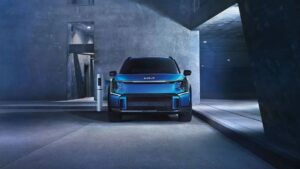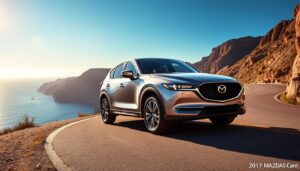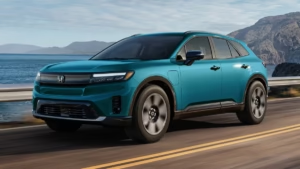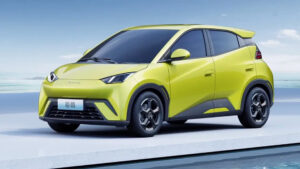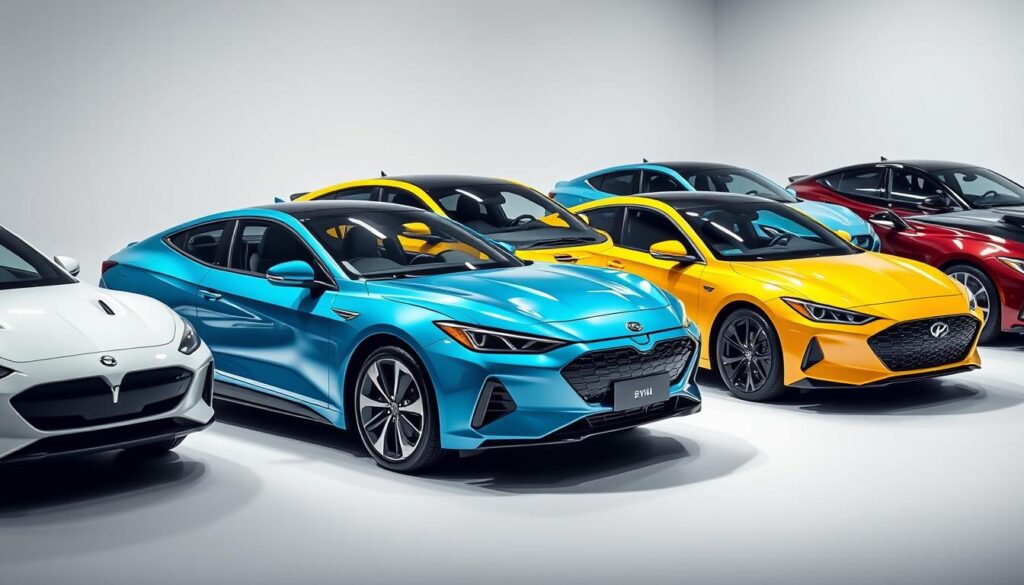
Hybrid cars are becoming more popular as we move towards eco-friendly options. They use less fuel, produce fewer emissions, and cost less to run. This makes them a great choice for those looking for a greener vehicle.
Recently, hybrid cars have gotten better in range, performance, and being kind to the environment. They’re a good middle ground for those who want to cut down on carbon emissions but don’t want to give up on driving fun.
Car and Driver says the newest hybrid cars are even better. They test each car with over 200 data points. This means they check about 400 cars every year. They found some top picks for 2025, like the 2025 Honda CR-V Hybrid, 2025 Hyundai Tucson Hybrid, and 2025 Mazda CX-50 Hybrid.
Key Takeaways
- Hybrid cars offer improved fuel efficiency, reduced emissions, and lower operating costs.
- The latest hybrid cars have seen significant improvements in range, performance, and sustainability.
- Car and Driver tests approximately 400 vehicles each year, including hybrid cars.
- Hybrid cars are a viable option for those who want to reduce their carbon footprint without sacrificing performance.
- The best hybrid cars for 2025 include models like the 2025 Honda CR-V Hybrid, 2025 Hyundai Tucson Hybrid, and 2025 Mazda CX-50 Hybrid.
- Hybrid cars are a great alternative to traditional gas-powered vehicles and electric vehicles.
The Evolution of Hybrid Cars in 2025
Hybrid cars have changed a lot from their start in the late 1990s. Thanks to hybrid technology, they’re now a good choice for those wanting to cut down on carbon emissions. Today, many car makers offer fuel-efficient cars for sale.
Studies show that mild hybrids can cut fuel use by up to 15% compared to regular cars. Full hybrids can cut engine use by 20% or more. Plug-in hybrids can go over 60 miles on electric power alone, with no emissions.
Soon, we’ll see new hybrid car models from Volkswagen, MG, and Peugeot. The Dacia Bigster will have a new engine that runs on petrol and LPG. These new cars will make the hybrid car market even more competitive, with many going fully electric by 2030.
Hybrid cars offer better fuel efficiency and lower upkeep costs than traditional cars. Their regenerative braking systems also help save on brake wear. As the market keeps growing, we’ll see even more hybrid technology and more people choosing fuel-efficient cars.
Latest Innovations in Hybrid Technology
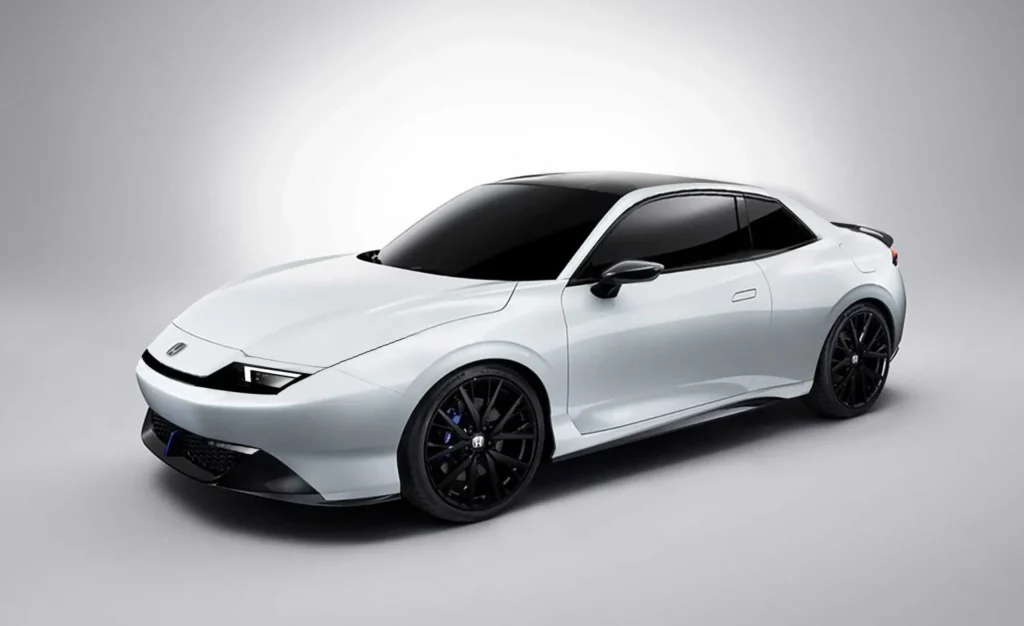
Hybrid technology has made big strides in recent years. Many car makers are pouring money into research. Now, hybrid cars offer better range, performance, and are more eco-friendly. They’re a great choice for those looking to cut down on carbon emissions.
Key advancements include extended electric-only ranges for plug-in hybrids. There’s also enhanced fast-charging capabilities. And, solid-state batteries are being used, promising better energy, faster charging, and safety. Plus, recyclable and sustainable materials are being used in battery production to lessen the environmental impact.
Hybrid cars offer several benefits:
- Improved fuel efficiency
- Reduced emissions
- Lower operating costs
These advantages make hybrid cars appealing for those seeking an eco-friendly option. Hybrid technology has also led to new features. For example, intelligent energy management systems and advanced lightweight materials boost fuel efficiency and electric-only range.
As more people want hybrid vehicles, car makers are pushing to make them better. With ongoing innovations, eco-friendly cars are becoming more popular. Hybrid car benefits are making them a solid choice for those aiming to reduce their carbon footprint.
Top Hybrid Car Manufacturers and Models

Several manufacturers lead in hybrid car models, thanks to their innovative designs and fuel efficiency. Toyota and Honda are at the forefront, with a variety of hybrid models for different needs and budgets. The Toyota Prius, for example, has been the top hybrid in the U.S. for years, known for its reliability and fuel-saving features.
Other notable brands include Chevrolet, Mercedes-Benz, Ford, Lexus, Infiniti, Audi, BMW, Kia, and Hyundai. They offer a range of hybrid models, each with unique features and benefits. For instance, the Hyundai Ioniq Hybrid has an EPA-estimated MPG rating in the high 50s, making it the most fuel-efficient hybrid. The Ford Fusion Hybrid is also a hit, ranking as the second best-selling hybrid in the U.S.
- Toyota Prius
- Honda Civic Hybrid
- Hyundai Ioniq Hybrid
- Ford Fusion Hybrid
These hybrid models have received great reviews for their performance, fuel efficiency, and value. As more people look for fuel-efficient cars, we can expect even more innovative hybrids from top brands in the future.
Performance Metrics of Modern Hybrid Cars
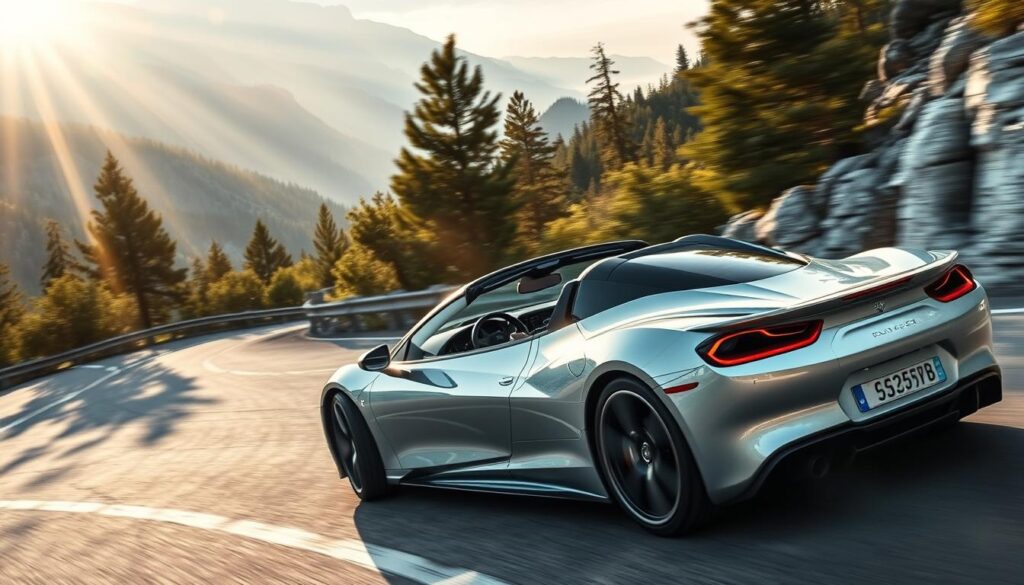
Modern hybrid-cars have made big strides in performance. They offer better acceleration and handling. The hybrid car benefits include being more fuel-efficient and producing fewer emissions. This makes them a great choice for those who want to save on fuel without losing out on performance.
Studies show that hybrid electric vehicles can go further than battery electric vehicles. They use both an electric motor and a gasoline engine. This combination gives them an edge in terms of range.
When comparing hybrid car vs. electric car, hybrids strike a perfect balance. They combine the best of electric and gasoline-powered cars. The Toyota Prius, for example, is known for its smooth ride and quick acceleration. Hybrid car reviews often highlight its excellent fuel economy and low emissions.
Some key performance metrics of modern hybrid-cars include:
- Improved acceleration and handling
- Better fuel efficiency and lower emissions
- Increased driving range compared to battery electric vehicles
Overall, modern hybrid-cars are a great mix of performance, efficiency, and eco-friendliness. They appeal to those who care about the environment and want a car that performs well.
| Hybrid Car Model | Fuel Economy (MPG) | CO2 Emissions (g/mile) |
|---|---|---|
| Toyota Prius | 51 | 178 |
| Honda Insight | 45 | 200 |
| Honda Civic Hybrid | 44 | 210 |
Fuel Efficiency and Range Improvements
Hybrid-cars are known for being fuel-efficient. Many models offer better range and performance. For example, the Toyota Prius gets 52 miles per gallon in the city and 53 on the highway. This is thanks to a mix of an engine and electric motors, which save fuel and cut emissions.
Hybrid-cars have many benefits. They use less fuel, produce fewer emissions, and cost less to run. Cars like the Honda Civic Hybrid and Honda Accord Hybrid are also fuel-efficient. They help drivers cut their carbon footprint.
Here are some key stats on hybrid-cars’ fuel efficiency:
- Hybrid vehicles are 20-35% more fuel-efficient than gas-only cars, mainly in city driving.
- Plug-in hybrids (PHEVs) can go up to 50 km or more on electric power before using the petrol engine.
- PHEVs can cut fuel costs by over 70% for drivers who charge their cars often.
City Driving Performance
In city driving, hybrids get a big fuel efficiency boost. They use regenerative braking and start-stop tech to save fuel. This makes eco-friendly cars great for city driving.
Highway Efficiency Ratings
On highways, hybrids also save fuel. They use electric power at high speeds. For example, the Toyota Prius gets 53 miles per gallon on the highway, perfect for long trips.
Total Range Capabilities
The range of hybrid-cars depends on the model and hybrid system. But, using fuel-efficient cars and hybrid car benefits leads to big fuel and emission savings. This makes hybrids a good choice for those wanting to reduce their environmental impact.
Environmental Impact and Sustainability Features
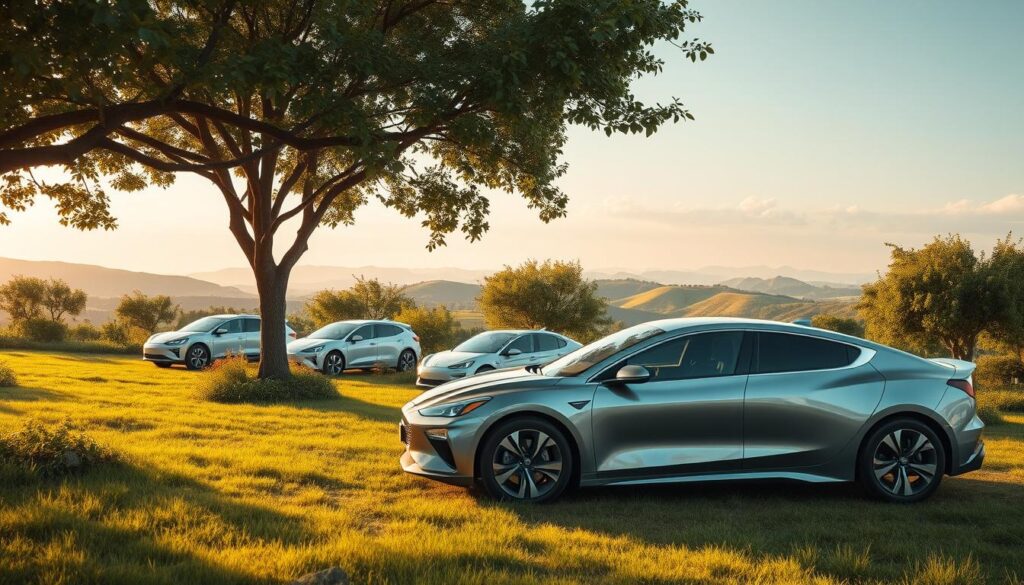
Hybrid cars are a top pick for those wanting to be kind to the planet. They cut down on emissions and save money on fuel. For instance, the Toyota Prius is famous for its green tech, like a solar roof and eco-friendly inside.
Hybrids use less fuel, which means they emit fewer pollutants. Studies show they can cut fuel use by up to 30% compared to gas cars. Plus, their regenerative braking system makes brake pads last longer, reducing dust and environmental harm.
Some standout eco-friendly features of hybrids include:
- Less fuel use
- Lower emissions
- Regenerative braking system
- Eco-friendly interior materials
In summary, hybrids bring many green benefits. They’re a smart choice for those wanting to lessen their environmental footprint. As more people seek eco-friendly cars, hybrid tech will keep playing a big role in making travel greener.
Price Range and Value Proposition
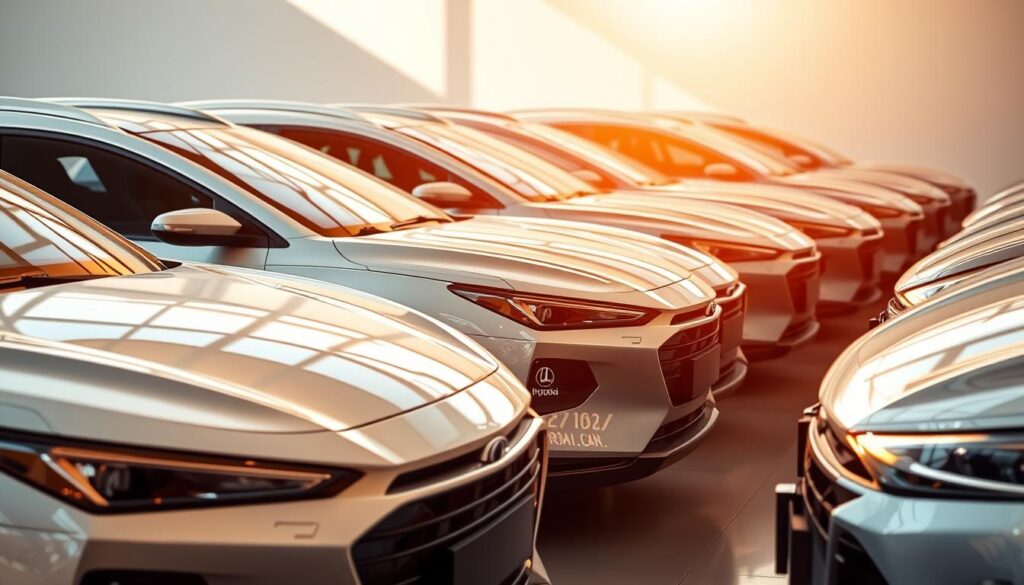
There’s a wide range of prices for hybrid car models, from affordable to luxury options. The Environmental Protection Agency lists 51 types of hybrid-cars for U.S. buyers.
The Toyota RAV4 Hybrid, Honda Civic Hybrid, and Honda Accord Hybrid are top fuel-efficient cars. They come in various trim levels, balancing performance with fuel savings.
Many owners save a lot on fuel costs, with some hybrids reaching up to 40 miles per gallon. They also hold their value well, with some retaining up to 50% of their original price after five years.
When looking at the total cost, remember to consider purchase price, fuel, maintenance, and repairs. The Toyota Prius, Honda Insight, and Hyundai Ioniq Hybrid are among the most budget-friendly options.
Charging Infrastructure and Compatibility
When you think about buying a hybrid car, consider the charging setup and how it fits with your needs. Hybrid-cars can go further on electric power, which is great for those who want to cut down on carbon emissions. In the U.S., there are thousands of places to charge your electric vehicle, with most being Level 2 chargers.
Hybrid-cars and electric cars both have their good points and downsides. But, hybrids offer more flexibility in charging. They can be charged at home and at public stations. Reviews show that charging times vary, from under 20 minutes with DC fast chargers to over 20 hours with Level 1 chargers.
Here’s a quick look at how different charging levels affect range per hour:
- AC Level 1: 5 miles of range per hour of charging
- AC Level 2: 25 miles of range per hour of charging
- DC fast charging: 100 to 200+ miles of range per 30 minutes of charging
As more people choose hybrid and electric cars, we need better charging options. Companies like Ford and Audi are using the North American Charging Standard (NACS) plug. This makes it simpler to charge your car on the move.
Maintenance and Reliability Factors
Hybrid-cars are known for being reliable and fuel-efficient. They need oil changes every 5,000 to 8,000 kilometers. Regular tasks like brake checks, tire rotations, and fluid checks are similar to gasoline cars.
But, hybrid-cars might cost more to repair because of their complex systems. The regenerative braking system can make brake pads last longer. This might lower maintenance costs.
The battery in hybrid-cars can last from 160,000 to 240,000 kilometers. Regular checks are key to keeping the battery in good shape. Hybrid car reviews stress the need for proper maintenance to extend the vehicle’s life.
- Inspecting the hybrid battery system every 40,000 kilometers
- Replacing engine oil and oil filters every 20,000 kilometers
- Flushing and replacing brake fluid every 60,000 kilometers
By sticking to these maintenance tasks, owners offuel-efficient cars can keep their vehicles reliable and long-lasting.
Comparing Hybrid Cars to Full Electric Vehicles
When choosing between a hybrid car and an electric car, it’s key to look at the good and bad points of each. Hybrid-cars are a mix of traditional cars and electric ones. They use less fuel and produce fewer emissions. Plus, they cost less upfront than electric cars.
Many people who own hybrid-cars say they are reliable and perform well. Electric cars, on the other hand, have no tailpipe emissions and might cost less to maintain. The right choice depends on what you need and like.
Here is a comparison of the two options:
| Vehicle Type | Upfront Cost | Emissions | Maintenance Costs |
|---|---|---|---|
| Hybrid Car | Lower | Some emissions | Similar to gas-only vehicles |
| Electric Vehicle | Higher | Zero tailpipe emissions | Potentially lower |
Choosing between a hybrid car and an electric car needs careful thought. You should think about your budget, how you drive, and your environmental concerns. By looking at the good and bad of each, you can make a choice that fits your needs and helps the planet.
Government Incentives and Tax Benefits
Hybrid car owners might get government incentives and tax breaks. This includes federal and state tax credits. For instance, the Toyota Prius can get up to $4,502 in federal tax credit.
The Internal Revenue Code Section 30D says new plug-in EVs or FCVs might get up to $7,500 in credit. The amount depends on the battery size. Vehicles with at least 7 kilowatt hours of battery capacity get a minimum of $3,751.
When you claim the tax credit, keep these points in mind:
- Modified adjusted gross income (AGI) limits for credit eligibility
- Minimum battery capacity of at least 7 kilowatt hours
- Gross vehicle weight rating of less than 14,000 pounds
- MSRP limits for credit eligibility, such as $80,000 for vans, SUVs, and pickup trucks
Reading hybrid car reviews can guide you in picking a fuel-efficient car. With the right hybrid car benefits and fuel-efficient cars, you can cut down on taxes and help the environment.
Conclusion: The Future of Hybrid Vehicles
Hybrid vehicles are set to be key players in the future of green transportation. They offer a mix of efficiency, performance, and care for the environment. This makes them a bridge between old gas cars and new electric ones.
Hybrid cars are getting better at using fuel, with some going over 50 miles per gallon. This means they cut down on pollution and save money on gas. They also use regenerative braking, which turns movement into electricity. This helps them use even less energy.
The future looks bright for hybrid cars. More people will choose them thanks to government help and growing awareness. There’s a hybrid car for every budget and taste. So, hybrids will keep growing in popularity, helping make cars greener.
